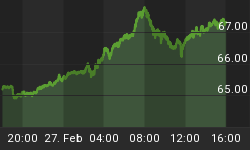Investor Doubt Increases Correction Odds

The S&P 500 traded at 1,850 intraday on December 31, 2013. Last week's intraday low was 1,862, or just 0.64% above the level seen 135 calendar days earlier. Why have investors become so hesitant in 2014? Answer: The economy and earnings. From The Wall Street Journal:
Behind the stock market's anxious ups and downs of late lies the fear that a weakening U.S. and global economy could dash hopes for an uptick in corporate earnings. For the first quarter, earnings season is nearly done. More than 90% of big companies have reported results and they were lackluster. Most beat analyst estimates, but only because expectations were rock bottom. Profit gains for S&P 500 companies were just 2.1% overall compared with a year earlier, well below the previous quarter's 8.5% rise, FactSet said. Now investors are seeing soft reports on industrial production, housing starts, consumer sentiment and European economic growth, and they are growing anxious.
Navigating A Stealth Correction In Stocks
As noted in this week's stock market video below, it is not possible for stocks to experience a multi-week or multi-month correction without a breakdown occurring in the major stock indexes first. For example, if investor are concerned enough about future economic outcomes to spark a stock market correction, the chart below would look worse than it does as of noon Monday.

Last week, we covered the concept of a stealth bear market in stocks. The concept is explored in detail in the video below, allowing us to better understand the odds of a breakdown in the major stock indexes.
DirecTV Deal Met With A Yawn?
Typically, if there is confidence that stockholders on either side of the aisle in a takeover deal will be winners, we would see one of the stocks go up. That is not what we were seeing early in Monday's session. From Reuters:
Equities have come under pressure, with consecutive weekly declines for the first time since January, as investors have become leery about growth prospects. Last week, readings on retail sales and consumer sentiment fell shy of expectations while labor and housing data provided reason for optimism. AT&T (T) lost 1.7 percent to $36.12 after the telecom company said it will acquire DirecTV (DVT) for $48.5 billion, as it seeks fresh avenues of growth beyond the maturing U.S. cellular business. DirecTV shares lost $1.81 at $84.37.
Investment Implications - Patience Needed
The market's indecisive nature from a risk tolerance perspective can be seen in the chart of the NASDAQ below. The negative slope of the blue 50-day moving average tells us investor conviction has been waning for some time now. In terms of risk-management guideposts, we would feel better about tech and stocks in general if (a) the NASDAQ would recapture its 50-day at 4,159, and (b) the slope of the 50-day turned back up.

The market's pricing mechanism will guide us if we are willing to monitor and adjust as new fundamental and technical information comes to light. For now, we continue to hold a mix of stocks (SPY), bonds (TLT), and cash.















